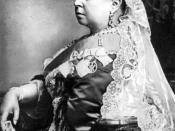One hundred and forty years ago, British North America was a territory separated politically into the following British colonies: Upper Canada, Lower Canada, Nova Scotia, Prince
Edward Island, New Brunswick, Newfoundland, and British Columbia. Unifying such a region into a single country was a challenge; however, it was achieved by thirty-three Fathers of Confederation." Among this group of exemplary politicians, Alexander T. Galt, Eaton Cartier, Charles Tupper, John Macdonald and George Brown played central roles. Through their efforts, Canada became a nation.
The Charlottetown Conference, the first meeting of the colonial representatives, was held to address concerns and thoughts generated by the issue of confederation. Maritime leaders had considered the federation of the colonies, and decided to hold a conference at Charlottetown,
Prince Edward Island, to discuss the feasibility of a federal union among themselves. John A. Macdonald and George Brown, who were already promoting a general union of all British North American provinces, asked permission to attend.
This request was granted. Seven delegates from Upper and Lower Canada arrived at Charlottetown on September 1, 1864. With persuasive speeches, these delegates emphasized the benefits of provincial union in North America. The issues raised necessitated an additional conference, which was scheduled for the following month, in Quebec City.
The Quebec Conference was attended by thirty-three delegates, representing all of the colonies. By the time the second day of this conference had ended, a motion was passed in favour of federal union. After several days of heated debate, the Conference summarized its proposal for federation in a document entitled, "The Quebec Resolution," or "The Seventy-Two Resolution." The resolution was submitted to the provinces for examination. Upon the approval of the provinces, the resolution was sent to the British government for authorization.
At a conference held in London, during December, 1866, sixteen...



Not bad
I thought this was mediocre. i mean it was alright. Just a few rough spot s in the essay. Almost there though. Good ideas and concepts. Your on the right track man.
7 out of 7 people found this comment useful.